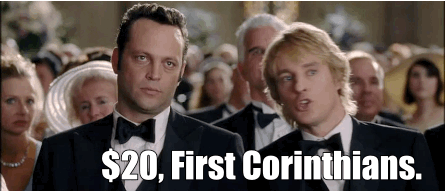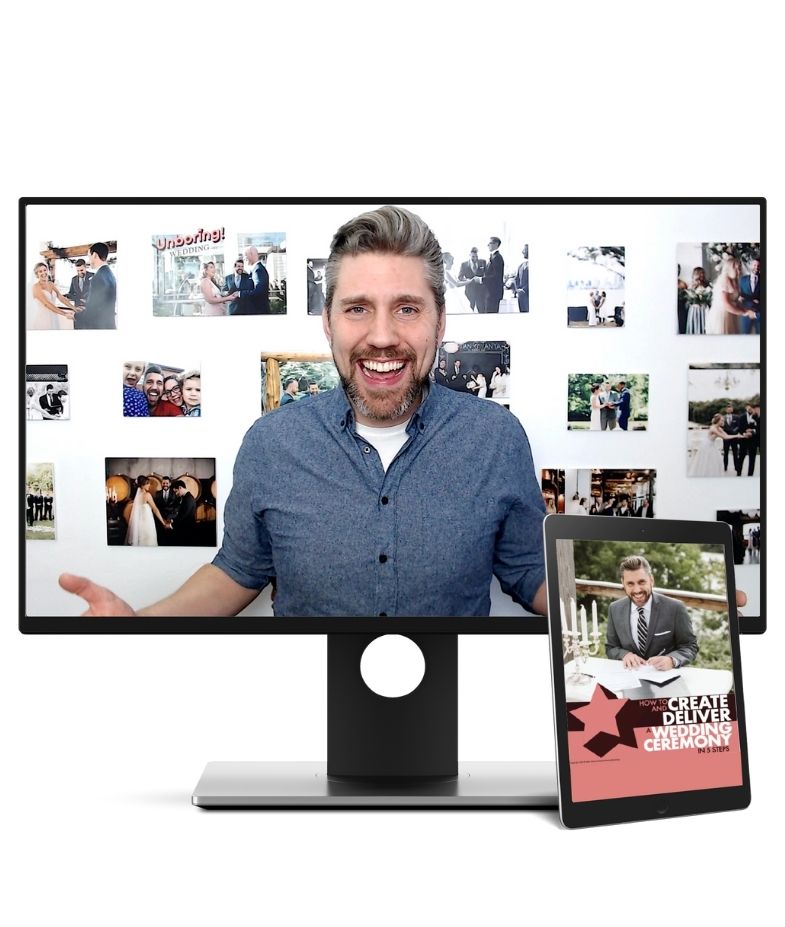You’re a wedding officiant or a couple looking for sample readings for your upcoming wedding ceremony. And you just want this part to be easy. In fact, I’m surprised you haven’t just scrolled right down to look for sample readings already! (Spoiler alert: I haven’t included any.) Basically, you just want to find a verse or a poem or a quote here on the Internet, think “Oh that’s nice” about it, and copy and paste it into your ceremony.
I’m going to save you the trouble: skip the sample wedding ceremony reading.
Huh?
That’s right: don’t include a sample reading. Cut it. Leave it out. Your wedding ceremony – whether you’re a couple or an officiant – doesn’t benefit from a sample wedding reading.
The only people who benefit from sample readings are cheeky wedding guests who make bets with each other about which tired, overused wedding reading will be trotted out this time.

(Remember this scene from Wedding Crashers?)
Now before you bring out the pitchforks and torches or reach through your screen to strangle me about all the touching wedding ceremony readings you’ve seen, let me say this: I’m not necessarily telling you to ditch readings altogether. (More on that below.) I’m telling you not to use a sample reading. I’m telling you to stop looking. The operative word here is sample.
Here’s why I think sample wedding readings for ceremonies are bad – and why you need to ditch the sample reading in your wedding ceremony for something better.
Sample wedding ceremony readings aren’t personal
I conduct an in-person ceremony planning session with the couple I’m marrying about four to six weeks before their wedding. At this meeting, we work through the 10 parts of a standard wedding ceremony, iron out all their preferences, and decide what elements they want to add. And sometimes, the bride or groom asks me this question: “Do you have a list of sample readings we can choose from?”
My answer: “No, I don’t.”
They’re a bit taken aback. Then I tell them why.
I tell my couple that if I’m choosing their reading for them, we’re doing it wrong.
Everything about their wedding ceremony needs to be about them. Personal. I tell their story, I interview their loved ones, and I make sure their wedding vows are exactly what they want to say to each other. Nothing about their ceremony is canned. So why would we throw in a reading that’s not specific to the couple? Just because that’s what you do in wedding ceremonies? Not good enough.
Then I tell them two more things about why I won’t recommend a sample reading.
No one remembers sample wedding ceremony readings
One of our aims, when we’re striving to be a great wedding officiant, is to make the ceremony memorable. Couples want their loved ones to remember their wedding for years to come. (For good reasons, that is.)
I’ve never left a wedding (either as a guest or the officiant) and heard guests saying, “Oh my! I really loved that reading selection by Faulkner about modern love! I’ll never forget that!”
Nope. When guests are buzzing while they file out, it’s always about the flower girl or how the groom cried or the hilarious story or the moving vows.
Sample wedding ceremony readings aren’t memorable because they aren’t personal to the couple. Every element should be about, for, or by the couple.
Sample readings score a big fat zero on the memor–ometer.
Here’s what Rebecca said after I officiated her wedding last summer:
“Mark’s personalized ceremonies set the tone for the evening, and is something we will never ever forget. Thank you doesn’t seem like enough! THANK YOU THANK YOU for making our day unforgettable!!!” (Yep. Three exclamation marks.)
See what she said there?
- They’ll never forget.
- Their day was unforgettable.
- The ceremony set the tone for a great evening.
A sample reading in a wedding ceremony doesn’t do any of those things, mostly because no one will remember it, and it just takes up space.
Sample wedding readings interrupt the emotional flow of the ceremony
The best wedding ceremonies have all the feels. Before it starts, there’s a thick mantle of excitement in the air you can just feel. Then with our officiant opening remarks, we want to get everyone laughing and feeling comfortable. As officiants, we want to give an outlet for all that excitement. Then come the tears of joy as the processional unfolds. Then more laughing and crying when we tell the couple’s story. Then more tears when the vows come.
Then… a sample reading. *record scratch*
We don’t want to go from laughing to crying to laughing to crying to “Huh. Okay.” There’s just no need for it.
According to research, “when we get emotional, the amygdala in our brain is stimulated and our bodies often secrete adrenaline. Somehow, these two processes work on the hippocampus, which is the centre of memory function, and our memories for that time period are sharpened.” Here’s what I mean in normal-speak:
When we feel, we remember.
As wedding officiants, we have the opportunity to essentially craft a program that showcases the uniqueness of our couple and brings the guests through an arc of powerful feelings. And every element of the wedding can be geared towards that aim.
THE KIND OF READINGS TO INCLUDE IN THE WEDDING CEREMONY
Now for the good news: a personal, memorable, emotional reading selection can be the cherry on top of an already-amazing wedding ceremony. It can fit right in with the make-’em-laugh, make-’em-cry elements that only the best wedding ceremonies include.
How do we make that happen?
Wedding readings should mean a lot to the couple
Let’s get back to that ceremony planning session with the couple, where I tell them I won’t recommend a sample reading. Because what I tell them next is crucial. I say, “If you want a reading, then take a few days to scan your memory and think of something that means a lot to you. A reading that sticks to a memory you have or describes your story and relationship perfectly.”
In one case, this led to one of the most emotional wedding memories I have. Period. The bride thought about it and came back with, “One of my favourite books as a kid was Oh, The Places You’ll Go by Dr. Seuss. I would ask my dad to read it to me incessantly. I’ve asked him to read that in the ceremony.”
Read it he did. And let me tell you: there was not a dry freaking eye in that whole place. It was the closest I’ve come to sobbing like a child while officiating a wedding. It was absolutely beautiful.
I could go on with further examples of the couple who chose a Shakespearean sonnet because they met in English Lit class or the couple who chose a passage from Harry Potter because they were Potterheads. But you get the point.
When the officiant chooses the reading, it’s just “nice” or “beautiful.” When the couple chooses the reading, it can blow us all away.
Wedding readings should be relevant to the person reading
It’s very common for the couple to ask someone who is special to them to do the reading – a parent or cousin, for example. So what happens when we send that special person up there, a piece of paper in hand, with a reading on it that – after all the laughing and crying and awwing – will kinda land with a thud?
I always feel a little bit bad for the person who has to come up and read if that reading isn’t personal, and especially if it’s delivered without any explanation as to why it’s being read.
It doesn’t have to be that way. Just as in the case of the bride’s dad who read Oh, The Places You’ll Go, when we ask someone to come up and read and it’s something the reader chose for the couple, or something the couple chose that’s so important to them, or even something the reader personally wrote as a gift to the couple – well, now we’re talking! Then the reader has a tool in their hand to complement the other personal elements of the ceremony and deliver something they can be proud of.
Before we send someone up to read in the wedding ceremony, we need to equip them.
How do we equip wedding ceremony readers? Here are a couple of ways:
- Make sure the couple provides a reading that will fit the reader’s relationship to the couple.
- Where possible, ask the reader to take a minute to explain why this selection has been chosen, and why it means so much to have it read in the ceremony today.
Wedding readings should heighten the emotions of the ceremony
When choosing a reading for a wedding ceremony, it’s best to ask: how does this contribute to the emotional journey of the ceremony? The opening remarks have us laughing. The processional has us swooning. The story has us laughing and crying. The vows have us tearing up. The kiss has us cheering. The signing has us getting into party mode. And the reading…?
When we’ve done it right, the reading will have as much of an emotional impact as every other part of the wedding ceremony.
Each element of the wedding ceremony is like a block, and each block can have a “big feeling” attached. When we script a ceremony with this in mind, the friends and family feel like they’ve been on a ride. Except… this is no frivolous ride. This is a communal experience of two people, who mean the world to everyone in the room, committing their lives to each other.
And the huge importance of that is the best reason to put a lot of thought into how these emotional blocks work together for the best – and most memorable – ceremony ever.
Stop looking for a sample wedding reading on the Internet. Ask your couple to think through their own history and discover something that will give us all the feels.

